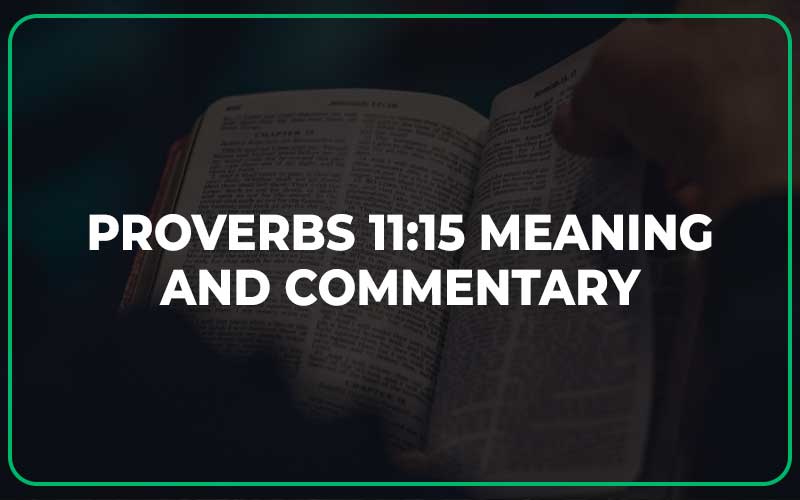Proverbs 11:15
“Whoever puts up security for a stranger will surely suffer, but whoever refuses to shake hands in pledge is safe.”
Proverbs 11:15 Meaning
Proverbs 11:15 warns against becoming a guarantor or cosigner for someone we don’t know well or trust completely. It emphasizes the potential consequences of taking on financial responsibility for others without careful consideration.
Proverbs 11:15 Commentary and Explanation
Proverbs 11:15 may seem straightforward, but it holds profound wisdom that can guide us in our daily lives.
The first part of this verse warns against becoming a guarantor for someone we don’t know well or trust. It’s a cautionary reminder of the potential consequences when we take on financial responsibilities for others. When we put up security or become a surety for a stranger, we are putting our own resources and well-being at risk. This can lead to suffering, both financially and emotionally, if the stranger fails to fulfill their obligations.
Throughout the Bible, we find numerous passages that emphasize the importance of financial responsibility and caution when dealing with financial matters. Proverbs 6:1-5, for example, warns against becoming surety for a friend and urges us to free ourselves like a gazelle from the hand of the hunter. This underscores the idea that we should exercise discernment and discretion in financial dealings.
On the other hand, the second part of the verse encourages a more cautious approach when it comes to entering into agreements or pledging one’s resources. Refusing to shake hands in pledge means that we should be careful about making commitments, especially those that involve our finances or assets. This cautious approach aligns with biblical principles found in Ecclesiastes 5:5, which advises us to let our “yes” be yes and our “no” be no, avoiding rash vows or commitments.
In essence, Proverbs 11:15 teaches us about the importance of discernment and prudence in our financial dealings. It encourages us to be cautious when considering becoming a guarantor for others, especially strangers, and to exercise wisdom when making commitments or pledges. By doing so, we can safeguard our financial well-being and avoid unnecessary suffering, while also maintaining our integrity and honoring God’s principles of financial stewardship.
Also Read: Proverbs 3:14 Meaning and Commentary
Context of Proverbs 11:15
Proverbs is a book of wisdom literature that provides practical advice for daily living. It contains numerous short, concise sayings that offer guidance in various areas of life. Proverbs 11 specifically focuses on the topics of righteousness and wisdom, contrasting them with wickedness and foolishness.
In the surrounding verses, Proverbs 11:14 highlights the importance of seeking wise counsel, while Proverbs 11:16 emphasizes the graciousness of a kind-hearted woman. These verses, along with Proverbs 11:15, collectively illustrate the importance of making wise decisions and being judicious in our actions.
Breaking Down the Key Parts of Proverbs 11:15
“Whoever puts up security for a stranger will surely suffer”: This part of the verse warns us that assuming financial responsibility for someone we don’t know well can lead to negative consequences. It serves as a cautionary reminder that we should be cautious when taking on the debts or obligations of others.
“Whoever refuses to shake hands in pledge is safe”: On the other hand, this part of the verse suggests that those who exercise caution and choose not to hastily become guarantors for strangers will be spared from potential suffering or loss. It encourages us to be prudent in financial matters and not to rush into commitments without careful consideration.
Lessons From Proverbs 11:15
This Proverb teaches us several important lessons:
- Exercise discernment and caution: We should be thoughtful when making financial decisions, especially when it involves assuming responsibility for others. It is crucial to thoroughly consider the character, trustworthiness, and reliability of the person we are vouching for.
- Seek wise counsel: Instead of relying solely on our own judgment, it is wise to seek advice from trusted individuals who can offer guidance and insight into the situation. Consulting with mentors or individuals with financial expertise can help us make informed decisions regarding financial partnerships or commitments.
- Prioritize integrity and honesty: The verse implies that it is better to maintain personal financial security by refusing to make financial commitments for strangers. It encourages us to prioritize our own financial well-being and avoid potentially harmful situations.
Biblical Translations of Proverbs 11:15
Proverbs 11:15 King James Version (KJV)
“He that is surety for a stranger shall smart for it: and he that hateth suretiship is sure.”
Proverbs 11:15 English Standard Version (ESV)
“Whoever puts up security for a stranger will surely suffer harm, but he who hates striking hands in pledge is secure.”
Proverbs 11:15 New American Standard Bible (NASB)
“He who is surety for a stranger will suffer for it, but one who hates being a guarantor is secure.”
Proverbs 11:15 New King James Version (NKJV)
“He who is surety for a stranger will suffer, but one who hates being surety is secure.”
Proverbs 11:15 New Living Translation (NLT)
“It’s a dangerous thing to guarantee payment for someone else’s debt. Don’t do it!”
Proverbs 11:15 Christian Standard Bible (CSB)
“Whoever puts up security for a stranger will suffer, but the one who hates such agreements is protected.”
Final Thoughts
As Christians, it is essential to approach financial matters with wisdom, caution, and discernment. Proverbs 11:15 serves as a reminder to carefully consider the implications and potential risks before making financial commitments on behalf of others.
While it is important to help and support those in need, we must also exercise prudence to protect our own financial stability. Let us strive to be good stewards of our resources and seek God’s guidance when faced with decisions that involve financial responsibilities for others.

